The Role of Magnesium in Reducing Irritability and Low Mood
Introduction
When life feels heavy, your temper shortens, or even small inconveniences make you snap, it’s easy to blame stress, hormones, or lack of sleep. But there’s a quiet, crucial mineral that may be playing a big role in how stable—or unstable—your mood feels: magnesium.
Often called the “calming mineral,” magnesium is one of the most powerful yet overlooked nutrients for emotional regulation. From easing irritability to lifting mild depression, magnesium works on the brain, the nervous system, and even your hormonal balance to restore a sense of inner peace.
Let’s explore how this mineral affects mood, what causes deficiencies, and how to use supplements and lifestyle changes to feel emotionally balanced again.
🧩 What Is Magnesium and Why It Matters for Mood

Magnesium is an essential mineral involved in more than 300 biochemical reactions in the body. It helps regulate muscle function, blood pressure, nerve transmission, and energy production. But beyond physical health, magnesium plays an underappreciated role in neurotransmitter balance and nervous system calm.
In the brain, magnesium acts like a gatekeeper for NMDA receptors—tiny channels that control how your neurons fire. Too much activity here can cause overstimulation, leading to anxiety, irritability, and restlessness. Magnesium helps keep this system in check, creating stability and calmness in the brain.
It’s also deeply tied to serotonin, dopamine, and GABA—neurochemicals that influence happiness, motivation, and relaxation. Without enough magnesium, these systems can falter, making you more prone to low mood or irritability.
😣 Signs You Might Be Low in Magnesium
Even mild magnesium deficiency can lead to emotional and physical changes that are often misinterpreted as purely psychological. Here are some telltale signs:
Irritability and low frustration tolerance
Anxiety or constant tension
Low mood or depressive symptoms
Muscle cramps or twitching
Poor sleep or waking up unrested
Headaches or migraines
Heart palpitations or “fluttery” sensations
Many people today—especially those under chronic stress—are magnesium deficient without realizing it. Processed foods, excess caffeine, and even certain medications (like proton pump inhibitors or diuretics) can deplete magnesium levels.
🔬 The Science Behind Magnesium and Emotional Balance
Magnesium’s Role in Neurotransmitter Regulation
Magnesium helps control neurotransmitters—chemical messengers that send signals throughout your nervous system. Specifically, it supports the production of:
Serotonin, the “feel-good” chemical linked to mood stability and contentment.
Dopamine, which regulates motivation and pleasure.
GABA, your brain’s main calming neurotransmitter.
When magnesium levels are low, these neurotransmitters can become unbalanced, leading to emotional volatility, irritability, or sadness.
Regulating the Stress Response (HPA Axis)
The HPA axis—short for hypothalamic-pituitary-adrenal axis—is your body’s central stress response system. Chronic stress can cause it to overreact, flooding your body with cortisol (the stress hormone).
Magnesium acts as a natural buffer against cortisol, helping your body adapt to stress more effectively. It keeps your HPA axis from becoming hyperactive, preventing that “wired but tired” feeling many people experience after prolonged anxiety or exhaustion.
Improving Sleep and Restorative Recovery
Magnesium promotes deep, restorative sleep by relaxing the muscles and calming the nervous system. Better sleep itself can dramatically reduce irritability and emotional volatility. Magnesium also helps regulate melatonin—the hormone responsible for your sleep-wake cycle.
Supporting Mitochondrial Energy Production
Your brain consumes a lot of energy. Magnesium helps your cells’ mitochondria produce ATP—the body’s energy currency. When brain cells are under-fueled, cognitive fatigue sets in, which can show up as irritability, brain fog, or apathy.
🧠 Magnesium and Depression: What the Research Says
There’s growing scientific evidence linking low magnesium levels with depressive symptoms and emotional instability.
A 2017 study published in PLoS ONE found that adults who took 248 mg of magnesium daily experienced significant improvements in depression and anxiety within just two weeks—comparable to traditional antidepressant treatments in some cases.
A 2015 review in Neuropharmacology highlighted that magnesium deficiency can alter neurotransmitter function, leading to behavioral changes similar to depression in animal models.
In older adults, higher dietary magnesium intake has been correlated with lower risk of depression.
While magnesium isn’t a substitute for professional mental health care, the research suggests that correcting magnesium deficiency can be a key piece of the mood-regulation puzzle.
⚡ Why Modern Life Depletes Magnesium
Our ancestors didn’t have to worry about magnesium deficiency the way we do. Modern life, however, creates a perfect storm for depletion.
Soil Depletion
Industrial farming practices have stripped much of the magnesium from the soil, making modern produce less nutrient-dense than it used to be.
Processed Foods
Refined foods—white bread, pastries, fast food—contain little to no magnesium. A diet high in processed carbohydrates and low in leafy greens or nuts is a recipe for deficiency.
Chronic Stress
Every time your body releases cortisol, it uses magnesium to stabilize the nervous system. Prolonged stress essentially burns through your magnesium reserves.
Caffeine and Alcohol
Both act as magnesium depleters, increasing urinary excretion and lowering absorption.
Medications
Certain medications, like diuretics, birth control pills, and antacids, can reduce magnesium absorption or increase its excretion.
🥦 Best Dietary Sources of Magnesium
You can rebuild your magnesium levels naturally through diet. Focus on whole, unprocessed foods, especially:
Leafy greens: spinach, kale, Swiss chard
Nuts and seeds: almonds, pumpkin seeds, sunflower seeds
Whole grains: quinoa, brown rice, oats
Legumes: black beans, lentils, chickpeas
Dark chocolate (at least 70% cacao)
Avocados and bananas
Even with a balanced diet, many people don’t hit the daily requirement (310–420 mg for adults), especially if stress, caffeine, or medications are in play. That’s where supplementation can help.
💊 Supplementing Magnesium: What to Know
Magnesium supplements come in many forms, each with its own benefits and absorption rates.
Magnesium Glycinate
Highly bioavailable and gentle on the stomach
Excellent for calming the nervous system and improving sleep
Ideal for reducing irritability, anxiety, or low mood
Magnesium Citrate
Great for overall absorption and muscle relaxation
Can have a mild laxative effect, helpful if you also struggle with constipation
Magnesium Malate
Supports energy production and reduces fatigue
Suitable for those dealing with tiredness or low motivation
Magnesium Threonate
Crosses the blood-brain barrier effectively
May enhance memory, cognition, and overall brain function
Magnesium Chloride or Sulfate (Topical)
Found in Epsom salt baths or sprays
Absorbed through the skin, beneficial for relaxation and muscle recovery
For mood and irritability, magnesium glycinate or threonate are often the best choices
⚖️ Dosage and Safety
The recommended daily allowance (RDA) for magnesium is:
Men: 400–420 mg/day
Women: 310–320 mg/day
For therapeutic purposes (such as stress or mood support), many people benefit from 200–400 mg of supplemental magnesium per day, depending on diet and individual tolerance.
Always start on the lower end to assess tolerance, as too much magnesium—especially citrate—can cause loose stools. If you have kidney disease or other medical conditions, consult your healthcare provider first.
🌙 How to Take Magnesium for Mood Support
Timing matters. For most people, magnesium works best in the evening because of its relaxing effect on the nervous system. Taking it before bed can help reduce mental chatter, improve sleep, and set the stage for a calmer morning.
You can also pair it with vitamin B6, which enhances magnesium absorption and further supports serotonin production.
For an even more calming effect, combine magnesium with:
L-theanine (promotes relaxation without sedation)
Taurine (stabilizes mood and supports GABA)
Glycine (enhances sleep quality and stress resilience)
💨 Breathwork and Magnesium: A Synergistic Duo for Calming the Nervous System

Breathwork and magnesium work beautifully together. While magnesium restores biochemical balance, breathing retrains your nervous system to respond differently to stress.
Try this short 4-7-8 breathing exercise while supplementing magnesium:
Inhale through your nose for 4 seconds
Hold your breath for 7 seconds
Exhale slowly through your mouth for 8 seconds
Repeat for 5–8 rounds
This slows your heart rate, increases parasympathetic activity, and complements magnesium’s calming effects perfectly.
Therapeutic Practices That Boost Magnesium’s Effectiveness
Reduce Caffeine and Alcohol
Cutting back helps your body retain magnesium longer.
Prioritize Sleep
Magnesium helps you sleep better, and good sleep preserves magnesium levels. It’s a reinforcing loop.
Take Epsom Salt Baths
Absorb magnesium through the skin while relaxing your muscles—perfect for stressful evenings.
Stay Hydrated with Electrolytes
Magnesium works synergistically with potassium and sodium to keep your cells balanced.
Mindfulness and Yoga
Slow, restorative movements lower cortisol levels, conserving magnesium reserves.
🌤️ Real-Life Benefits: What People Notice When They Restore Magnesium Levels
People who correct a deficiency often report:
Feeling calmer under pressure
Improved patience and emotional control
Deeper, uninterrupted sleep
Reduced PMS-related irritability
Better mental clarity and focus
Less muscle tension or headaches
For some, it’s like turning down the static in their mind—the world feels less overwhelming.
⚕️ When to See a Professional
If low mood or irritability persist despite supplementation and lifestyle changes, it’s important to consult a healthcare provider. Magnesium can be an excellent supportive nutrient, but it’s not a replacement for therapy or medication when clinically needed.
Testing red blood cell magnesium levels (rather than serum magnesium) can help determine if your levels are truly low, since most magnesium is stored in tissues, not the bloodstream.
🧬 The Mind-Body Link: Why Magnesium Matters More Than You Think
Magnesium is one of the body’s quiet regulators—a bridge between the biochemical and the emotional. Every muscle twitch, thought, or heartbeat depends on it. When your magnesium levels drop, the entire body goes into subtle tension mode, which can quickly translate to mood instability.
By replenishing this essential mineral, you’re not just supporting your physical health—you’re helping your nervous system find its rhythm again.
🌱 Final Thoughts: Calm Starts from Within
We often look for emotional balance in therapy, relationships, or routines (and those are vital). But there’s something profoundly grounding about restoring the mineral foundation of calm.
Magnesium reminds us that serenity is not just a mental state—it’s a physiological one too. When your cells are nourished, your brain can exhale.
If you often feel edgy, tense, or mentally drained, it might not just be “in your head.” It could be a simple case of your body asking for magnesium.
📚 References
Tarleton, E.K., & Littenberg, B. (2017). Magnesium intake and depression in adults. PLoS ONE, 12(6): e0180067.
Boyle, N.B., Lawton, C., & Dye, L. (2017). The effects of magnesium supplementation on subjective anxiety and stress. Nutrients, 9(5): 429.
Eby, G.A., & Eby, K.L. (2006). Rapid recovery from major depression using magnesium treatment. Medical Hypotheses, 67(2): 362–370.
Murck, H. (2002). Magnesium and affective disorders. Nervenarzt, 73(8): 730–735.
Walker, A.F., et al. (2003). Magnesium supplementation alleviates premenstrual symptoms of fluid retention. Journal of Women’s Health, 12(5): 447–453.*
Related Posts
-

Nootropics That Promote Calm and Rest
Explore the world of calming nootropics — natural brain enhancers that promote relaxation, better focus, and deeper rest. Learn how L-Theanine, magnesium, ashwagandha, and other adaptogens help balance your nervous system, reduce stress, and support restorative sleep.
-

Best Natural Supplement Stack for Sleep
Discover the best natural supplement stack for deep, restorative sleep. Learn how nutrients like magnesium, L-theanine, glycine, and calming herbs such as chamomile and ashwagandha work together to relax your body, calm your mind, and improve sleep quality—naturally and safely.
-

Combining L-Theanine and Magnesium for Sleep: A Calm Night, Naturally
Discover how combining L-Theanine and Magnesium can help you drift into deep, restorative sleep. Learn how this natural duo calms the mind, relaxes the body, and supports your nervous system—without grogginess the next morning.
-

How to Sleep Better After Intense Workouts
Struggling to fall asleep after a tough workout? Learn how to optimize your post-training recovery with nutrition, hydration, and science-backed sleep strategies. Discover how to calm your nervous system, balance hormones, and wake up fully recharged for your next session.
-

Ashwagandha and Valerian: A Bedtime Combo for Deep Rest and Emotional Reset
Discover the calming synergy of Ashwagandha and Valerian root, two natural sleep aids that help quiet the mind, ease anxiety, and promote deeper rest. Learn how this herbal duo supports the nervous system, balances stress hormones, and restores emotional peace — without next-day grogginess.
-

How to Create a Resilience-Boosting Diet
Discover how to build emotional and physical strength from the inside out with a resilience-boosting diet 🍎. Learn which foods stabilize your mood, how supplements like magnesium and omega-3s strengthen your stress response, and why pairing nutrition with breathwork and therapy creates lasting calm, focus, and vitality 🌿💪.
-

Best Teas and Herbal Blends for Calmness: Nature’s Way to Restore Inner Peace
Ashwagandha, the ancient adaptogenic herb, helps your body find balance during stress. Known as “Indian ginseng,” it supports cortisol regulation, boosts energy, and restores calm clarity. Discover how this powerful root promotes resilience, emotional balance, and steady vitality — one cup at a time. 🌸
-

Parenting and Emotional Strength: How to Raise Children Without Losing Yourself
Empathy is the bridge that connects hearts — the quiet power to understand, feel, and support another’s emotions without judgment. Learn how empathy strengthens relationships, enhances communication, and cultivates deeper compassion in everyday life. 🌿
-

How to Bounce Back from Public Failure: Reclaiming Confidence, Purpose, and Power
Visualization is more than imagination — it’s brain training for resilience. By picturing calm, success, or healing, you activate the same neural pathways as real experience. Learn how daily visualization rewires your brain for confidence, emotional balance, and recovery from stress. ✨
-

Coping with Financial Stress Through Resilience: How to Stay Grounded When Money Feels Tight
Body awareness is the foundation of emotional resilience. By tuning into your body’s signals — tension, fatigue, or calm — you learn to recognize stress before it overwhelms you. Discover how mindfulness, gentle movement, and breathwork can deepen your connection with your body and restore balance from the inside out. 🧘
-

How to Stay Positive During Chronic Illness: A Guide to Emotional Strength and Hope
Creativity is more than art — it’s a form of healing. Whether through painting, writing, music, or small acts of expression, creativity helps release emotion, calm the nervous system, and reconnect you to joy. Discover how to use creativity as a tool for emotional balance, resilience, and self-discovery. 🌿
-

Resilience Tips for Caregivers: How to Stay Strong While Caring for Others
Joy isn’t the absence of pain — it’s the quiet strength to find light even in challenging times. Cultivating joy through small daily moments restores balance, releases stress, and reminds you of life’s beauty. Learn how to reconnect with authentic happiness, rebuild emotional energy, and nurture your nervous system through gratitude, presence, and play. 🌿
-

Building Resilience After a Breakup: How to Heal, Rebuild, and Rise Stronger
Social connection is one of the strongest predictors of emotional resilience. During difficult times, genuine relationships act as anchors — calming the nervous system, reducing stress hormones, and helping you regain perspective. Learn how cultivating real human connection can strengthen your mind, heart, and overall well-being. 🌿
-

How to Stay Emotionally Strong During Job Loss
Your emotions are powered by brain chemistry — a delicate balance of neurotransmitters like serotonin, dopamine, and cortisol. When these chemicals work in harmony, you feel calm, focused, and resilient. Learn how daily habits, nutrition, and mindfulness can support your brain chemistry and boost emotional well-being naturally. 🌿
-

The Role of Hormones in Emotional Stability: How Your Chemistry Shapes Your Calm
Hormones shape more than your body — they shape your emotions, resilience, and sense of calm. From cortisol to serotonin, these chemical messengers influence how you react to stress, connect with others, and recover from challenges. Learn how to balance your hormones naturally to build lasting emotional stability and harmony within. 💫
-

Mitochondria and Emotional Energy: The Cellular Power Behind Your Mood
Breathwork is one of the most powerful tools for emotional regulation and cellular balance. Through intentional breathing, you can calm your nervous system, increase oxygen flow to the brain, and even support mitochondrial energy. Learn how conscious breathing connects body and mind — transforming stress into presence and emotional strength. 🌿
-

Inflammation and Its Impact on Mood Resilience: The Silent Link Between Body and Mind
Inflammation doesn’t just affect the body — it impacts the mind. Chronic inflammation alters brain chemistry, depletes serotonin, and makes emotional recovery harder. Learn how calming inflammation through nutrition, mindfulness, and sleep can restore balance, resilience, and a renewed sense of emotional strength. 💫
-

How Antioxidants Protect Emotional Well-being: The Hidden Link Between Oxidative Stress and Mental Health
Antioxidants do more than protect your body — they defend your mind. By neutralizing oxidative stress, antioxidants support serotonin, dopamine, and brain energy pathways that keep you calm, focused, and emotionally balanced. Discover how foods like berries, green tea, and dark chocolate nourish your brain, boost mood, and strengthen resilience from the inside out. 🌿✨
-

The HPA Axis and Emotional Health: The Hidden Bridge Between Stress and Mind
Neuroplasticity — the brain’s ability to rewire and adapt — is the foundation of emotional healing and resilience. When you face stress, trauma, or change, your neural pathways can reshape themselves to support new patterns of calm, focus, and self-awareness. Learn how daily practices like mindfulness, therapy, and breathwork strengthen neuroplasticity to transform emotional pain into personal growth. 🌸
-

Why Cortisol Control Is Key to Resilience: Mastering Stress to Build Emotional Strength
Controlling cortisol — the body’s main stress hormone — is the secret to lasting resilience. When cortisol levels stay balanced, your mind becomes clearer, emotions steadier, and energy more sustainable. Learn how breathwork, mindset shifts, adaptogens, and daily rhythms can help you calm your stress response and build true inner strength. 🌞💪
-

Dopamine’s Influence on Motivation and Recovery: Reigniting Drive and Balance
Healthy relationships are the foundation of emotional balance and resilience. Whether romantic, familial, or platonic, genuine connection releases dopamine, serotonin, and oxytocin — the brain’s “bonding trio” — helping us feel secure, motivated, and seen. Learn how trust, empathy, and communication not only strengthen your connections but also reshape your nervous system for deeper emotional well-being. 🌿🤝
-

The Role of Serotonin in Resilience: How This “Mood Molecule” Shapes Emotional Strength
Serotonin — often called the “resilience molecule” — plays a vital role in how we handle stress, regulate mood, and recover from emotional challenges. Beyond happiness, this powerful neurotransmitter helps balance the gut-brain axis, stabilize the nervous system, and support emotional flexibility. Learn how nutrition, sunlight, mindfulness, and adaptogens can naturally boost serotonin and strengthen your emotional resilience. 🌞🧠
-

How Neuroplasticity Supports Emotional Growth: Rewiring the Brain for Resilience
Neuroplasticity is the brain’s built-in power to grow, adapt, and heal — and it’s the foundation of emotional transformation. Every mindful breath, compassionate act, or reframed thought strengthens new neural pathways that support resilience and self-awareness. Learn how your brain rewires through daily habits, helping you turn emotional challenges into opportunities for growth and calm. 🌿
-

Tai Chi and Adaptogens for Mind-Body Balance: The Art of Harmonizing Energy and Resilience
Alchemy isn’t just an ancient science — it’s a timeless symbol of transformation and inner balance. By blending the physical and spiritual, alchemy teaches us that change begins from within. Just as metals are refined into gold, we too can transmute emotional pain, stress, and chaos into clarity and strength through mindful practice and self-awareness. 🌙✨
-

Cold Therapy and Emotional Control: Training the Mind Through the Body
Cold therapy isn’t just for athletes — it’s a tool for emotional mastery. By exposing your body to controlled cold, you train your nervous system to stay calm under stress, improving focus, mood, and resilience. This article explores the science of cold exposure, its impact on hormones and the vagus nerve, and how ice baths and cold showers can help you build emotional control, one breath at a time. 🧊🧘♂️
-

How Music Influences Emotional Recovery: The Healing Soundtrack of the Mind
Neuroplasticity — the brain’s ability to rewire and heal itself — is at the heart of emotional recovery. Through mindful habits, music, therapy, and consistent mental stimulation, your brain can form new connections that support resilience and well-being. Discover how neuroplasticity turns pain into growth, helping you rebuild balance, focus, and emotional strength. 🌿
-

Nature Therapy for Building Resilience: Reconnecting With the Healing Power of the Earth
Nature therapy helps rebuild emotional resilience by reconnecting you with the healing rhythms of the Earth. From forest walks to sunlight exposure, nature restores balance to your nervous system, lowers stress hormones, and teaches emotional adaptability. Learn how spending time outdoors can enhance mental clarity, calm anxiety, and awaken your natural capacity to heal. 🌞
-

Breathwork Techniques That Pair with Supplements: The Ultimate Synergy for Stress Relief and Mental Clarity
Breathwork and supplements create a powerful mind-body synergy for stress relief, focus, and energy. By combining intentional breathing with adaptogens, nootropics, and calming nutrients, you can naturally regulate cortisol, sharpen mental clarity, and boost emotional balance. This guide explores the best breathwork techniques and supplement pairings to help you feel centered, calm, and energized from the inside out. 🌿
-

Why Cortisol Balance Matters for Emotional Strength
Balancing cortisol — your body’s main stress hormone — is essential for emotional resilience. When cortisol is chronically high, your mind stays stuck in survival mode, leading to fatigue, anxiety, and emotional instability. This article explores how nutrition, supplements, breathwork, and therapy can help restore healthy cortisol rhythms, regulate the nervous system, and strengthen your ability to handle life’s challenges with calm focus and emotional strength. 🌿
-

Best Supplements for Students During Exam Season: Focus, Energy, and Memory Support
Studying late into the night? Learn which natural supplements can boost focus, memory, and mental stamina during exam season — without the crash. From omega-3s to Bacopa and Rhodiola, discover your brain’s ultimate exam support stack. 🎓🧠
-

Natural Memory Boosters for Seniors: How to Keep Your Mind Sharp and Focused
Stay mentally sharp and confident as you age. Discover science-backed natural supplements and lifestyle habits that boost memory, focus, and brain longevity for seniors. 🌿🧠
-

The Link Between Stress, Cortisol, and Memory Loss
Chronic stress can quietly erode your memory — and cortisol is the key culprit. Learn how stress hormones affect the brain, why the hippocampus shrinks under pressure, and how natural strategies can help you restore memory and mental clarity. 🧠✨
-

How to Build a Daily Supplement Routine for Memory Health
Want to sharpen your memory and stay mentally clear? Learn how to build a daily supplement routine for memory health — from morning focus to nighttime brain repair. Discover science-backed nutrients that boost recall, focus, and long-term cognitive resilience. 🧠🌿
-

Top 5 Natural Supplements for Memory Recall and Focus
Looking to boost memory and concentration naturally? Discover the top 5 supplements — Bacopa, Ginkgo Biloba, Lion’s Mane, Rhodiola, and Phosphatidylserine — that enhance focus, recall, and long-term brain health. 🧠✨
-

Top Supplements to Balance Mood Naturally
From omega-3s to adaptogens, discover the top natural supplements proven to support emotional balance, reduce stress, and promote inner calm — safely and effectively. 🌿✨
-

Can Omega-3 Fatty Acids Help with Mood Disorders?
Omega-3 fatty acids do more than support heart health — they can help balance mood, reduce depression, and calm anxiety. Discover how EPA and DHA nourish your brain, fight inflammation, and support emotional well-being from within. 🌊🧠
-

Vitamin D and Mood: The Sunshine Vitamin for Emotional Balance
Could the key to emotional balance be as simple as a little sunlight? Discover how vitamin D — the sunshine vitamin — influences serotonin, reduces inflammation, and helps you feel more positive and resilient year-round. ☀️💛
-

How Probiotics Influence Mood Through the Gut-Brain Axis
Discover how probiotics can do more than support your digestion—they can actually uplift your mood. This article explores the fascinating gut-brain axis and how balancing your gut bacteria through probiotics may help reduce anxiety, improve emotional stability, and support long-term mental well-being. 🌿🧠
-
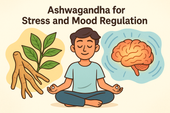
Ashwagandha for Stress and Mood Regulation
Discover how Ashwagandha, the powerful adaptogenic herb 🌿, helps your body manage stress and regulate mood. Learn how it balances cortisol, boosts GABA and serotonin, and supports emotional stability — helping you feel calm, focused, and resilient every day.
-

St. John’s Wort: Natural Support for Mild to Moderate Depression
Discover how St. John’s Wort, the “sunshine herb” 🌼, naturally supports mild to moderate depression. Learn how it boosts serotonin, balances mood, and promotes emotional resilience — with research showing its effectiveness compares to antidepressants, but with fewer side effects.
-

Rhodiola Rosea and Mood Resilience Under Stress
Discover how Rhodiola rosea helps your body adapt to stress 🌿. Learn how this powerful adaptogen balances cortisol, supports serotonin and dopamine, and strengthens emotional resilience — helping you stay calm, focused, and energized under pressure.
-

Chamomile and Lavender: Herbal Calm for Emotional Fluctuations
Discover how chamomile and lavender bring calm to emotional ups and downs 🌿. Learn how these two soothing herbs balance your nervous system, ease anxiety, and support restful sleep — naturally helping you find peace and emotional stability.
-

Saffron Extract and Its Surprising Benefits for Mood Disorders
Discover how saffron extract — the golden spice of joy 🌸 — can naturally support mood balance, ease anxiety, and lift mild depression. Learn what science says about its serotonin-boosting power, the ideal dosage, and how this ancient remedy compares to modern antidepressants.
-
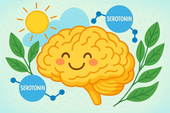
5-HTP and Serotonin: A Natural Path to Lifting Mood
Discover how 5-HTP naturally boosts serotonin 🌞 — the neurotransmitter behind mood, sleep, and emotional balance. Learn how this plant-derived compound supports happiness, reduces anxiety, and improves rest by helping your brain create more serotonin the gentle, natural way.
-
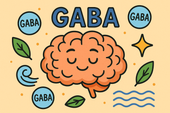
GABA Supplements for Reducing Anxiety and Mood Swings
Discover how GABA supplements can help reduce anxiety and balance mood naturally 🌿. Learn how this calming neurotransmitter works to quiet the mind, ease stress, and improve sleep — plus which nutrients and habits can boost your body’s own GABA production for long-term emotional stability.
-
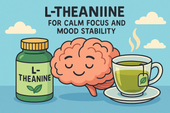
L-Theanine for Calm Focus and Mood Stability
Discover how L-theanine, the calming compound found in green tea 🍵, promotes focus, relaxation, and mood stability. Learn the science behind how it balances neurotransmitters, reduces stress hormones, and enhances clarity — helping you stay centered, calm, and productive without sedation.
-
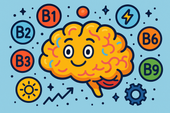
B Vitamins and Brain Chemistry: Supporting Energy and Emotional Balance
Discover how B vitamins power your brain chemistry ⚡. Learn how B6, B9, and B12 support serotonin, dopamine, and energy production — helping boost focus, mood, and emotional balance. From diet to supplements, explore how this vital nutrient group keeps your mind resilient and your energy steady.
-

N-Acetyl Cysteine (NAC) and Mood Disorders: What the Research Says
Learn how N-Acetyl Cysteine (NAC) supports brain health and mood balance 🧠. Discover how this antioxidant helps reduce oxidative stress, regulate glutamate, and improve emotional stability in depression, bipolar disorder, and anxiety — backed by cutting-edge psychiatric research.
-

Supplements for Bipolar Disorder: What May Support Stability
Discover the best supplements for bipolar disorder 🌿 that may support emotional stability and brain health. Learn how nutrients like omega-3s, magnesium, vitamin D, and NAC can help reduce inflammation, balance neurotransmitters, and complement traditional treatment safely.

















































